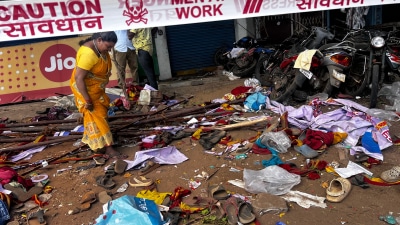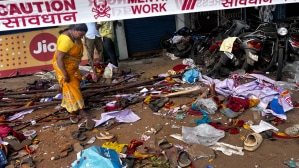SP holds convention in 5-star hotel & dubs NDA policies as anti-poor
AGRA, JULY 11: The party, which swears by the ideals of Ram Manohar Lohia, Jai Prakash Narayan and Acharya Narendra Dev and which proudly ...

AGRA, JULY 11: The party, which swears by the ideals of Ram Manohar Lohia, Jai Prakash Narayan and Acharya Narendra Dev and which proudly wears its Socialist tag up its sleeve, the Samajwadi Party (SP) indeed has come a long way.
Its national executive meeting, which, began here on the morning of July 10 in this historic city in the air-conditioned comforts of the impressive Mughal Sheraton, barely two km from the Taj Mahal, blasted the Vajpayee Government’s economic policies as being “anti-poor, anti-farmer, anti-labour and anti-national”.
The irony of the situation was not lost on the hordes of scribes — both local and outsiders — who have come here to cover the event, so much so that SP supremo Mulayam Singh Yadav had a tough time a day before defending the decision to hold the conclave in the plush environs of the hotel. For the 80-odd delegates, the party has booked 75 rooms in the hotel, each room holding a tariff tag of Rs 3,000 per day (excluding the discount the party may have been offered for bulk-booking). Lest he be subjected to more severe criticism, Yadav very cleverly chose to stay in the local Circuit House, while his trusted lieutenant Amar Singh was put up in the new, swankier Jaypee Palace Hotel.
The wordings of the party’s economic resolution, passed on Monday afternoon, looked strikingly similar to the ones passed by the Swadeshi Jagaran Manch (SJM), the economic arm of the RSS, in this very city less than a month ago. The bosses at Nagpur are bound to be mightily pleased going through the four-page document. Sample this: Before and after the American President’s visit to the country, the decision to remove the import duty on, first, 714 commodities and later another 715 commodities has given a free hand to MNCs to enter the country. This has placed crores of people working in domestic industries in jeopardy.
Like the RSS-SJM combine, it too lashed out at the ruling coalition for its disinvestment spree, but failed to outline a blue-print for the revival of the ailing public sector units (PSUs). “There is no will in the Government to revive these units,” party general secretary Singh pointed out, adding. “There cannot be anything worse than disinvestment. It is merely an admission of their administrative incapability.” The party wanted the Government to lay more stress on agriculture — a field which was criminally ignored by the ruling combine.
Singh, who briefed mediapersons on discussions of the first session, sought to pre-empt queries on the resemblances in the economic resolutions of the two ideologically-opposed outfits by derisively terming the SJM as “Videshi Jagaran Manch,” and urged “all patriotic Indians to oppose at all the levels the present Government’s policy which is pushing the country towards economic slavery”.
The only way out of this morass, the resolution proclaimed, was a Socialist economic policy. “In this system, production is commensurate with consumption and distribution is based on the needs,” it sermonised.
But despite its anti-Government rantings, there persists a niggling doubt about the genuineness of its tirade. For most part, as on previous occasions, it chose to direct its attack on the Congress party for pushing the country towards disaster. Indeed, to most persons, it seemed that Sonia Gandhi’s party was its enemy Number one.
“The Vajpayee Government is today talking about second-generation reforms,” Singh asserted, adding, “But I want to ask. Who was the author of the first-generation reforms. The BJP, when cornered, always gets away by saying that they are merely carrying forward the policies enunciated by the Congress regime since 1991.”
Asked about the perception that the SP had gone soft on the Vajpayee Government, hence its reluctance to take to the streets against its policies, Singh replied: “We are the only party to have come out in the open against the anti-people, anti-farmer policies of this dispensation. It is because of our steadfast opposition that the people of Uttar Pradesh have voted so overwhelmingly in our favour in the panchayat elections.”







- 01
- 02
- 03
- 04
- 05
























